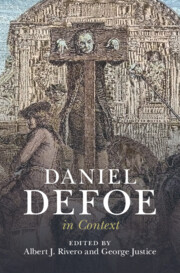Book contents
- Daniel Defoe in Context
- Daniel Defoe in Context
- Copyright page
- Contents
- Illustrations
- Notes on Contributors
- Preface
- Acknowledgements
- Chronology
- Part I Life and Works
- Part II Literary Context
- Part III Authorship and Copyright
- Part IV The Monarchy and Parliament
- Part V Social Structures and Social Life
- Chapter 23 The Penal System
- Chapter 24 Defoe and Religion
- Chapter 25 Social Status and Social Mobility
- Chapter 26 Education and Opportunity
- Chapter 27 Men and Women
- Chapter 28 Defoe and China
- Chapter 29 London, 1660–1731
- Chapter 30 The Environment
- Chapter 31 Marriage Law
- Chapter 32 Daniel Defoe and the Law of the Sea
- Chapter 33 Disability
- Chapter 34 Defoe and Colonialism
- Chapter 35 Defoe and Animals
- Chapter 36 Defoe and Slavery
- Chapter 37 Economics
- Chapter 38 Defoe and the Supernatural
- Chapter 39 Defoe and America
- Part VI Critical Fortunes and Literary Afterlife
- Further Reading
- Index
Chapter 31 - Marriage Law
from Part V - Social Structures and Social Life
Published online by Cambridge University Press: 27 April 2023
- Daniel Defoe in Context
- Daniel Defoe in Context
- Copyright page
- Contents
- Illustrations
- Notes on Contributors
- Preface
- Acknowledgements
- Chronology
- Part I Life and Works
- Part II Literary Context
- Part III Authorship and Copyright
- Part IV The Monarchy and Parliament
- Part V Social Structures and Social Life
- Chapter 23 The Penal System
- Chapter 24 Defoe and Religion
- Chapter 25 Social Status and Social Mobility
- Chapter 26 Education and Opportunity
- Chapter 27 Men and Women
- Chapter 28 Defoe and China
- Chapter 29 London, 1660–1731
- Chapter 30 The Environment
- Chapter 31 Marriage Law
- Chapter 32 Daniel Defoe and the Law of the Sea
- Chapter 33 Disability
- Chapter 34 Defoe and Colonialism
- Chapter 35 Defoe and Animals
- Chapter 36 Defoe and Slavery
- Chapter 37 Economics
- Chapter 38 Defoe and the Supernatural
- Chapter 39 Defoe and America
- Part VI Critical Fortunes and Literary Afterlife
- Further Reading
- Index
Summary
This chapter examines Defoe’s engagement with late seventeenth- and early eighteenth-century debates about the legal regulation of marriage, focusing on Moll Flanders (1722) and Roxana (1724). Through his heroines’ conflicted commentaries on their many matches, as well as his experiments with narrative sequencing and point of view, Defoe shows the dangers of turning marriage into a contract that can be formed and dissolved simply by exchanging consent. Although Defoe suggests that the canon law’s absolute prohibition on divorce is too restrictive, he backs away from proposing radical changes to the law. Whereas Moll Flanders suggests that spouses should be able legally to remarry in the lengthy aftermath of their partners’ desertion, Roxana cautions against contracting new unions prematurely. Even as the novels seek to shore up the legal regulation of the nuptial tie, they contest women’s loss of property and personhood during coverture.
Keywords
- Type
- Chapter
- Information
- Daniel Defoe in Context , pp. 257 - 264Publisher: Cambridge University PressPrint publication year: 2023

